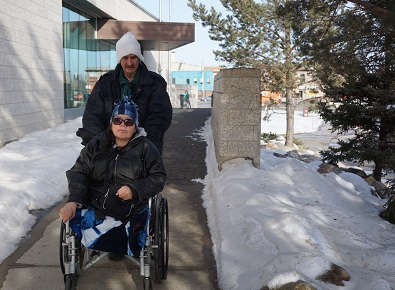Marlene Bird and her partner Patrick Lavallee outside court on March 15. Photo by Chelsea Laskowski.
Much of Canada is already familiar with the severity of Marlene Bird’s immediate injuries from the 2014 attack on her life in Prince Albert, but the photographic evidence will not be seen by the general public after a judge struck down a media request to access the photos for publication.
Around 10 photos of Bird taken in the aftermath of the near-fatal beating and burning that left her wheelchair-bound have been entered as evidence at Leslie Black’s dangerous offender hearing.
She required multiple skin grafts, had her legs amputated, and lost vision in one eye as a result of Black’s actions.
Early on in the proceedings, Prince Albert Provincial Judge S.D. Loewen said he was aware of the heightened media interest in this case.
He addressed the photos, saying they are available to the public as exhibits during the hearing, but he also warned of the graphic nature of the photos and asked Crown prosecutor Jeff Lubyk to speak to Bird about her stance on whether those photos should be viewed any further.
During the hearing, expert psychologist Terry Nicholaichuk said of the beating “I saw the victim’s photographs. It was brutal.”
All witnesses at the hearing echoed that sentiment, calling the results of the attack “horrific” and “extreme.”
The prosecutor’s office filed its dangerous offender application citing a rarely used subsection that says “the court shall find the offender to be a dangerous offender if it is satisfied any behaviour by the offender, associated with the offence for which he or she has been convicted, that is of such a brutal nature as to compel the conclusion that the offender’s behaviour in the future is unlikely to be inhibited by normal standards of behavioural restraint.”
The topic of the photos came up again on Tuesday when a media agency requested access to the photos for publication.
Lubyk said he had spoken with Bird, who has asked that the photo only be made available in court. Loewen agreed to that.
“I doubt very much that anyone would want to see those photos and publish them,” he said.
He said he didn’t think anyone in court would want the publication of such sensitive photos of their loved ones, and added that the photos are not something that one simply looks at and forgets – they stick with a person.
It’s expected Black will be sentenced and receive a verdict on the dangerous offender application this summer.
